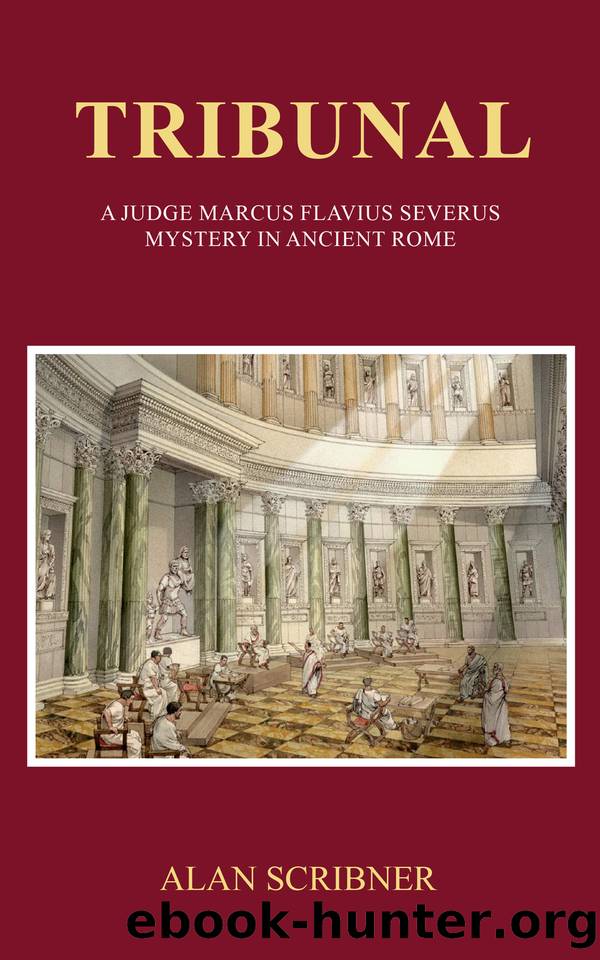Tribunal: A Judge Marcus Flavius Severus Mystery in Ancient Rome by Scribner Alan

Author:Scribner, Alan
Language: eng
Format: epub
Published: 2023-11-05T00:00:00+00:00
XV
The Civil Cases of Infamia, Iniuria and Calumnia
In the morning, Severus was scheduled to preside at the trial in the civil case of infamia, iniuria and calumnia, where the government official, Gaius Gemellus, is suing a satirical poet for libel and defamation resulting in injury. In his chambers in the Centumviral Court, Severus and his assessor Gaius Flaccus were getting ready for the trial.
Court clerk Quintus Proculus came in and reviewed the facts of the case with judge and Flaccus.
âPlaintiff Gemellus was in charge of a government program of charitable contributions for orphans and minors. Defendant, Antikles, is a satirical poet who wrote a poem depicting Gemellus as a sexual predator of both young boy and girl orphans under his care.
âGemellus denies that he molested any of the boys or girls in his charge, and complains he was wrongfully fired from his job on account of the poem. The poet answers that Gemellus is lying and that he was fired for acts of sodomy with young boys and girls he was supposed to be taking care of, not because of any poem. Moreover, even if the poem exaggerates, the poet says he can say what he wants to say without being censored. He says his writing is inspired by famous Roman satirists, Juvenal and Martial.â
Severus read over the poem.
âGemellus, protector of orphans and minors,
Warmly embraces boys and girls,
Just as he does with adults.â
âThere is no law against satire and truth is always a defense to defamation,â said Severus. âIf Gemellus âembracedâ the boys and girls under his charge, as the satire says, then he is not defamed. If he molests children, he has no case, and the poet has a complete defense. If he never molested any children, then we have to decide how far a satirical poem can go before lawsuits for iniuria, infamia and calumnia are valid. So, are both the plaintiff and defendant in court this morning?â
âYes. Their lawyers and witnesses are ready for trial.â
âThen letâs go into court and have a trial.â
âNot a moment too soon,â said Proculus to the judge. âThe audience is becoming unruly.â
A moment later, as the water clock showed the 9th hour, Severus went outside into the colonnade in the Basilica Julia. Under Roman law, all trials were held out of doors and open to the public. The judge mounted a four-foot-high platform, the Tribunal, in an open space in front of the columns. He took his seat on the military-style camp chair provided for the magistrate.
Proculus took a seat at a desk, below the judge and to his right. The desk was equipped with plenty of scrolls, styluses and ink, ready for the court clerk to take down the proceedings in Tironian Notes shorthand. The judgeâs assessor Flaccus took a seat on Severusâ left, from where he would listen to the evidence and arguments and make suggestions to the judge during the trial and help the judge decide the case once deliberations began. Standing behind the judge were two court lictors
Download
This site does not store any files on its server. We only index and link to content provided by other sites. Please contact the content providers to delete copyright contents if any and email us, we'll remove relevant links or contents immediately.
The Daily Stoic by Holiday Ryan & Hanselman Stephen(2709)
The Fate of Rome: Climate, Disease, and the End of an Empire (The Princeton History of the Ancient World) by Kyle Harper(2439)
People of the Earth: An Introduction to World Prehistory by Dr. Brian Fagan & Nadia Durrani(2347)
Ancient Worlds by Michael Scott(2104)
Babylon's Ark by Lawrence Anthony(2072)
Foreign Devils on the Silk Road: The Search for the Lost Treasures of Central Asia by Peter Hopkirk(2056)
India's Ancient Past by R.S. Sharma(1988)
MOSES THE EGYPTIAN by Jan Assmann(1973)
The Complete Dead Sea Scrolls in English (7th Edition) (Penguin Classics) by Geza Vermes(1843)
Lost Technologies of Ancient Egypt by Christopher Dunn(1799)
The Daily Stoic by Ryan Holiday & Stephen Hanselman(1773)
The Earth Chronicles Handbook by Zecharia Sitchin(1748)
24 Hours in Ancient Rome by Philip Matyszak(1681)
Alexander the Great by Philip Freeman(1653)
Aztec by Gary Jennings(1546)
The Nine Waves of Creation by Carl Johan Calleman(1521)
Curse Tablets and Binding Spells from the Ancient World by Gager John G.;(1512)
Before Atlantis by Frank Joseph(1486)
Earthmare: The Lost Book of Wars by Cergat(1470)
